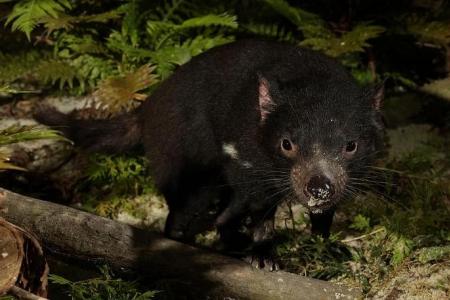Night Safari is home to 4 tasmanian devils from Australia
Hardly the cantankerous, dust storm-kicking Looney Tunes beasts, four tasmanian devils from Australia, each about the size of a shiba inu dog, have come to make their home at the Night Safari.
Making their debut in a new exhibit on Tuesday, these endangered animals will make Singapore their permanent home.
Mr David Schaap, senior wildlife officer from the Department of Natural Resources and Environment Tasmania, said that the Save the Tasmanian Devil Programme (STDP) was introduced in response to an infectious cancer that led to significant decline of tasmanian devil numbers in the wild.
Spread from one tasmanian devil to another through skin-to-skin and sexual contact, the devil facial tumour disease causes large facial tumours to grow around their mouths, making eating hard for the animals.
Most devils who catch the disease die from starvation.
With more than 80 per cent of the wild population of tasmanian devils succumbing since 1996, Mr Schaap said that STDP seeds these animals in zoos globally to build insurance colonies as a crucial response to the threat the species faces as a result of the disease.
Insurance colonies for threatened animals in captivity ensure they do not go extinct through conservation and breeding programmes.
The effort to bring the animals here from an insurance colony started in 2018, and much preparation was required before the zoo was ready to receive them, said Dr Luis Carlos Neves, vice-president of animal care at Mandai Wildlife Group.
Tasmanian devils have unique vocalisations such as growls, screams and screeches when feeding or during confrontations, and live in dark confined environments such as caves and burrows.
Dr Neves said the animal care team had to work closely with their counterparts in Australia to design a suitable habitat for the animals in Singapore and upskill the zoo’s animal care team to care for the endangered marsupials.
In 2019, the team travelled to Tasmania to undergo training and learn the biology of the animals, as well as how to safely manage, restrain them for medical procedures, and feed them properly.
During the pandemic in 2020, a video tour of the new exhibit here was filmed, so experts in Australia could verify that the facilities suited the animals’ needs.
After four years of preparation, Crumpet, Snickers, Jesse and Panini – as the four female marsupials are called – finally arrived in Singapore on Oct 7.
After the month-long mandatory quarantine, they now live in two expansive habitats with indoor dens and outdoor yards, which give them space to roam and explore, as well as a den that allows the nocturnal creatures to rest during the day.
The habitats in the Night Safari’s Wallaby Trail also feature eucalyptus trees and red flowered silky oak shrubs to simulate the devils’ native dry shrubland habitat.
Mr Razak Jaffar, assistant curator for marsupials at Mandai Wildlife Group, said that though the four female animals look similar, their personalities are quite distinct.
“Crumpet is a confident individual with a more dominant personality... Snickers, on the other hand, is much more reserved, preferring to hide in her nest box when Crumpet expresses her dominance,” said Mr Jaffar.
He added that Jesse and Panini have also formed a bond despite a rocky start, which involved hostile caterwauling and occasional squabbles.
“The pair now thoroughly enjoy each other’s company, preferring to sleep in the same nest box and appearing restless when they are not together,” Mr Jaffar said.
At the launch of the new exhibit, Mr Mike Barclay, group chief executive of Mandai Wildlife Group, said tasmanian devils will join many other native Australian species in the zoo.
Mr Barclay said: “We remain committed to ensuring the highest standards of welfare for all the ambassador animals under our care... and protecting threatened species and their native habitats.
“Crumpet, Snickers, Panini and Jesse will raise awareness regarding the threats that tasmanian devils face in the wild.”
Get The New Paper on your phone with the free TNP app. Download from the Apple App Store or Google Play Store now


